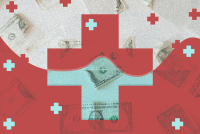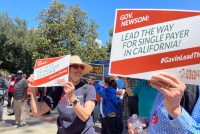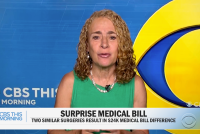Latest KFF Health News Stories
Census: Insured Population Holds Steady, With a Slight Shift From Private to Public Coverage
The Census Bureau on Tuesday released its 2020 findings regarding Americans’ income, poverty and health insurance coverage.
Justice Department Targets Data Mining in Medicare Advantage Fraud Case
The feds’ civil suit links exaggerated patient bills to “tens of millions” in overcharges.
Under Pressure, Montana Hospital Considers Adding Psych Beds Amid a Shortage
A hospital in Bozeman, Montana, is considering whether to add inpatient psychiatric care after a concerted push from mental health advocates. But even if it adds beds, hospitals across Montana provide a cautionary tale: finding enough workers to staff such beds is its own challenge, and some behavioral health units routinely reach capacity.
ICUs Are Filled With Covid — And Regret
Unvaccinated people are filling intensive care beds and dying of covid in record numbers in Tennessee and other Southern states. Many tell their nurses and doctors they regret the decision not to get the vaccine when they could.
Health Care Unions Defending Newsom From Recall Will Want Single-Payer Payback
If Gov. Gavin Newsom survives Tuesday’s recall election, the health care unions that have campaigned on his behalf intend to pressure him to follow through on his promise to establish a government-run health system in California.
Georgia Eyes New Medicaid Contract. But How Is the State Managing Managed Care?
More than 40 states have turned to managed-care companies to control costs in their Medicaid programs, which cover low-income residents and people with disabilities. As Georgia prepares to open bidding on a new contract, the question looms: Has this model paid off?
Why At-Home Rapid Covid Tests Cost So Much, Even After Biden’s Push for Lower Prices
Germans pay less than $1 per test. Brits get them free. Why do Americans pay so much more? Because companies can still demand it.
ECMO Life Support Is a Last Resort for Covid, and in Short Supply in South
Many more people could benefit from the lifesaving treatment than are receiving it, which has made for messy triaging as the delta variant surges across the South and in rural communities with low covid vaccination rates.
‘Luckiest Man Alive’: Why 9/11 First Responders’ Outlooks May Improve Even as Physical Health Fails
The New York City Fire Department’s 20-year report on the health consequences of the 9/11 terrorist attacks finds that first responders consistently report mental health quality-of-life indicators that are better than those of average Americans, even as their physical health declines.
It’s Not Just Covid: Recall Candidates Represent Markedly Different Choices on Health Care
Those seeking to replace California Gov. Gavin Newsom in Tuesday’s recall election disagree with him on more than mask and vaccine mandates. The conservative candidates tend to favor free-market solutions over Newsom’s expansion of publicly funded health coverage.
KHN’s ‘What the Health?’: The Future of Public Health
The covid pandemic has spotlighted the often-unseen role of public health in Americans’ daily lives. And the picture has not all been pretty. What is public health and why is it so important — and controversial? Dr. Ashish Jha, dean of the Brown University School of Public Health, explains the basics. Then, Joanne Kenen of Politico and Lauren Weber of KHN join KHN’s Julie Rovner to discuss what could happen next.
Even in Red States, Colleges Gravitate to Requiring Vaccines and Masks
As students return to campus, schools across the country are taking steps to enforce public health advice to keep people safe from covid. In deeply conservative South Carolina when elected officials tried to stop that, a professor took on the establishment and won.
‘An Arm and a Leg’: How Charity Care Made It Into the ACA
In this episode, we hear how the political tango over guaranteeing that nonprofit hospitals provide charity care nearly tanked the Affordable Care Act — and how the battle over the ACA “broke America.”
Colorado Clinic’s Prescription for Healthier Patients? Lawyers
Medical-legal partnerships in Montana, Colorado and elsewhere across the nation operate on the notion that fixing patients’ legal ills is a vital part of their health care.
California Set to Spend Billions on Curing Homelessness and Caring for ‘Whole Body’ Politic
California is embarking on a five-year experiment to infuse its health insurance program for low-income people with billions of dollars in nonmedical services spanning housing, food delivery and addiction care. Gov. Gavin Newsom said the goal is to improve care for the program’s sickest and costliest members and save money, but will it work?
Florida Spine Surgeon and Device Company Owner Charged in Kickback Scheme
Dr. Kingsley R. Chin and SpineFrontier were the subject of a recent KHN “Spinal Tap” investigation.
V-Safe: How Everyday People Help the CDC Track Covid Vaccine Safety With Their Phones
V-safe is a new safety monitoring system that lets anyone who has been vaccinated against covid-19 report possible side effects directly to federal health officials. Experts believe the smartphone tool has so far helped demonstrate the vaccines are safe.
The Pandemic Almost Killed Allie. Her Community’s Vaccination Rate Is 45%.
As the delta variant overtakes Mississippi and other undervaccinated parts of the country, one 13-year-old girl’s experience with covid and MIS-C shows a community’s reluctance to embrace public health precautions and continued vulnerability to the pandemic.
Watch: Same Providers, Similar Surgeries, But Different Bills
KHN Editor-in-Chief Elisabeth Rosenthal joins “CBS This Morning” to discuss the latest Bill of the Month installment, in which a man discovered the hard way that health plans can vary from one job to the next, even if the insurer is the same.
Telemedicine Abortions Offer Cheaper Options but May Also Undermine Critical Clinics
A change in FDA rules during the pandemic has let women receive the drugs needed for a medical abortion by mail after a telemedicine appointment. While some abortion rights advocates hail the move, others note that these services, which are often cheaper than going to a clinic, could siphon away patients needed to keep those brick-and-mortar facilities operating.


























